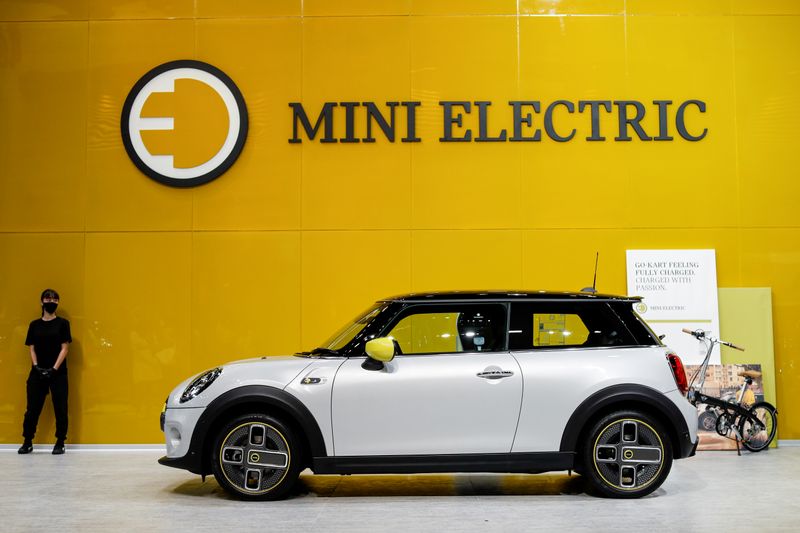By Chayut Setboonsarng
BANGKOK (Reuters) - The COVID-19 pandemic is accelerating the remaking of Thailand's automotive industry, the backbone of Southeast Asia's auto sector, as factory shutdowns compound a shift toward electric vehicles.
Thailand's auto-related businesses, which employ 900,000, are reopening after months of coronavirus shutdowns, promising relief for many laid-off workers.
But there's a catch: Thailand's shift toward electric vehicles (EVs) could pummel the local auto industry because it is dominated by hundreds of parts makers, while EVs require just 10% to 20% as many of parts as internal-combustion vehicles.
With an estimated one-third of a million jobs at risk, Thai auto-parts makers are scrambling into industries like medical equipment, a trend likely to keep reshaping Southeast Asia's second-largest economy after the pandemic passes.
"We are all worried ... this is a sunset industry," said Kasem Tiankanon, manager at Siam Filter Products Ltd.
The Bangkok-based company has avoided laying off any of its hundreds of workers by offsetting the drop in orders from automakers with an increase in replacement parts. The company is looking to branch out into making filters for industrial and medical use and is developing a new kind of protective mask.
"We cannot just stay in the auto business," Kasem said. "If you don't adjust, you'll die."
Others moved to packaging and aviation.
“It’s a pivot to industries that use the same processes because there is already expertise in machining,” said Sompol Tanadumrongsak, head of the Thai Auto-Parts Manufacturers Association.
The coronavirus damage to car demand will crush Thailand's output by almost half to 1.14 million vehicles this year, research firm IHS Markit forecasts.
Parts makers, which account for some 80% of the country's auto-industry workers, have laid off 20,000, a number that could hit 100,000 by year end, said Manit Promkareekul, president of the Automobile Labour Congress of Thailand.
EV prospects are brighter.
Global sales will rise 6% this year to 2.3 million vehicles before exploding to 45 million by 2030, the International Energy Agency forecasts.
STEERING TO ELECTRIC
Even before the new coronavirus struck, Thailand's parts makers were starting to shift gears as the global car industry moves toward EVs, spurred by the likes of Elon Musk's Tesla Inc. (O:TSLA).
The government in March targeted EVs at 30% of production, or 750,000 vehicles, by 2030, initially for domestic use in a bid to curb pollution.
Truck-chassis maker Sammitr Group last month received approval for a $170 million project to make 30,000 battery-power vehicles a year in a joint venture with a Chinese company.
In 2018 Honda Motor Co (T:7267) and Nissan Motor Co (T:7201) received approval for investments worth a combined $888 million to produce hybrid electric vehicles and batteries.
To be sure, Thailand faces competition from other countries in gaining factories for the expected EV boom. Toyota Motor Corp (T:7203) last year announced a $2 billion EV investment in Indonesia.
But even if Thailand attracts more EV production, 800 auto-parts companies and more than 325,000 jobs could be at risk because an EV uses 1,500 to 3,000 parts, versus 30,000 in a traditional gasoline vehicle, said Kiriya Kulkolkarn at Thammasat University.
CALLS FOR GOVERNMENT HELP
Great Wall Motor Co, (SS:601633) China’s top pickup truck maker, took over two General Motors Co (N:GM) plants in Thailand in February to make sport-utility vehicles and pickups - but held back from EV production.
Great Wall would need more support from the government to produce EVs, vice president Steven Wang told Reuters.
EV incentives from Thailand's Board of Investment have expired, and now the board is exploring new measures to attract investors, said secretary-general Duangjai Asawachintachit.
What is needed to ensure Thailand's competitiveness are steps to provide clarity to investors and customers, said Kiranee Tammapiban-udom of Maverick Consulting Group.

"The industry is approaching an inflection point," she said. "It will be left behind if policies do not accommodate EV manufacturing, its ecosystem and consumption."